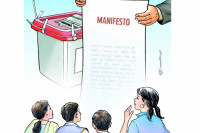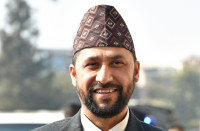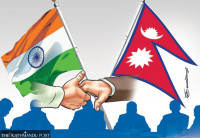National
PM Oli holds bilateral meeting with Laotian President Sisoulith in Tianjin
Discussions cover mutual interests as Nepali delegation engages with regional leaders.
Post Report
Prime Minister KP Sharma Oli held a bilateral meeting with the President of Laos Thongloun Sisoulith on Monday morning in Tianjin, China, on the sidelines of the Shanghai Cooperation Organisation (SCO) Summit 2025.
The prime minister’s secretariat said the two leaders discussed issues of mutual interest, focusing on strengthening bilateral ties and cooperation in areas of common concern.
PM Oli and other heads of participating governments are scheduled to address the SCO Summit at the Tianjin Meijiang Convention and Exhibition Centre today.
The bilateral meeting with Laos follows Oli’s engagement with Vietnamese Prime Minister Pham Minh Chinh on Sunday, where the two leaders discussed enhancing long-standing cooperation between Nepal and Vietnam. The talks emphasised collaboration in diplomatic, economic, and cultural areas.
On Saturday, PM Oli held a bilateral meeting with Chinese President Xi Jinping at the Tianjin Guest House. During the meeting, he conveyed Nepal’s objection to the India-China agreement to reopen trade through Lipulekh, which Nepal claims as part of its territory under the 1816 Sugauli Treaty. The leaders also reviewed bilateral relations and agreed to expand cooperation across various sectors. Oli described the talks with President Xi as “fruitful” and thanked him for the invitation to the SCO Plus Summit, marking Oli’s second visit to China within a year.
On Sunday evening, Oli attended a reception hosted by President Xi and First Lady Peng Liyuan for heads of state and government participating in the SCO Plus Summit. At the event, he exchanged greetings with Indian Prime Minister Narendra Modi and other leaders, further strengthening Nepal’s diplomatic engagement at the regional level.
The SCO Summit and the SCO Plus meeting, which began on Sunday, bring together leaders from Central, South, Southeast Asia, and other regions to discuss political, economic, and security issues.




 13.12°C Kathmandu
13.12°C Kathmandu














